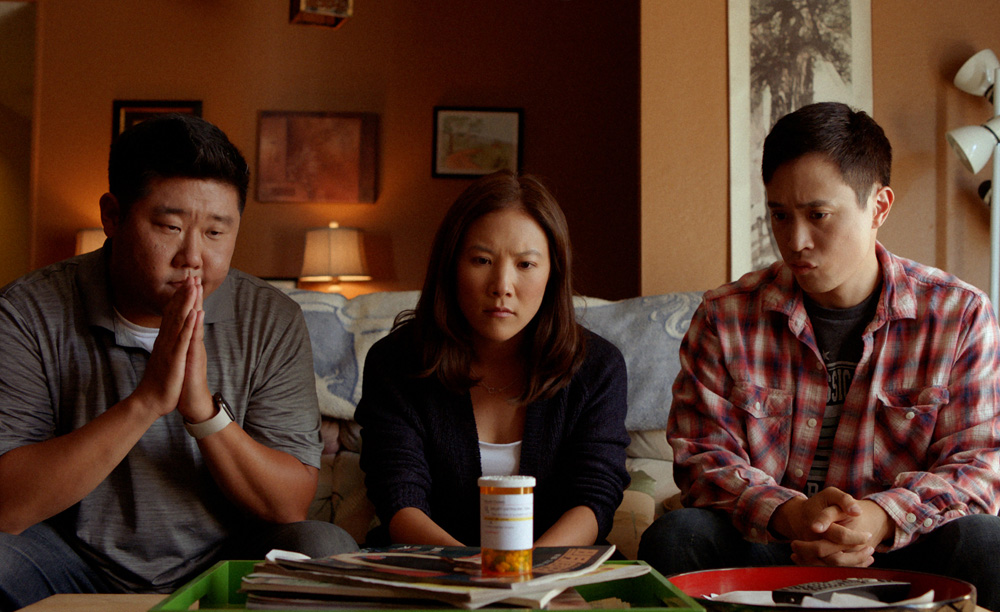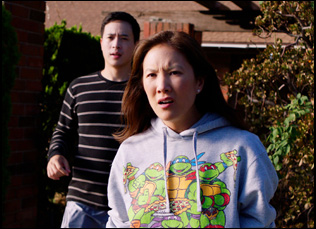Margaret (Ally Maki) doesn’t know how to feel about seeing her father (Dana Lee) in pain in “Dealing with Dad,” though she would be justified in taking at least some pleasure as old age has brought its share of maladies when considering how much negativity he brought into her life. She has rarely spoken to him since he didn’t come to her wedding, objecting to the groom because of his race, not that the two traded words much before when he’d berate her in front of friends at a baseball game for getting Bs on her report card and call her a “Bangkok call girl” when she began dating. Still, there was a passion there that she and her brothers Larry (Hayden Szeto) and Roy (Peter S. Kim) have found sorely missing since he lost his job a few months back, the once fearsome figure now tamed beyond all recognition and his children left unsure of what to do with all their conflicting emotions.
In Tom Huang’s fourth feature, humor becomes a great coping mechanism as Margaret reunites with her family in the Northern California suburb of Milpitas where having their patriarch’s energy level dip below the mellow community average is cause for concern. No one is feeling all that great when Margaret arrives, with Larry trading away his rare collector’s items to stay afloat and Roy gainfully employed as a mid-level bank employee but seeing his marriage slowly fall apart, making a prospect of reuniting under one roof both a pity party waiting to happen and potentially one of the few places where they’d find sympathy amongst one another. Still, tenderness is more likely to be shown in a withering insult than a bear hug among the clan who endure freezing temperatures inside the house when their mom (Page Long) wants to save on the heat, making the eventual thaw a little harder to come by.
As rough as the family may be around each other, Huang shows a delicate touch when considering how being united once in terror has allowed them to find ways to be there for one another when it seems like they’re at a loss for answers and “Dealing with Dad” plays as a broad comedy capable of tapping into an equally universal sense of experiencing the loss of a loved one even as they still live on. After charming audiences on the festival circuit since its premiere last year, the film recently arrived on VOD and digital and the writer/director spoke about turning his own personal frustrations within his own family into a cathartic comedy and enlisting a cast who could bring their own experiences to bear.
This film is based on my experience trying to get my dad out of depression. It took about eight years, and part of the reason was it took me a while to understand what it was and then it took me a longer to get my family and his friends to understand this is a disease. Especially in an Asian American community, depression is considered a weakness or something to be treated. It’s hard enough for me to get my parents to go to the hospital if they broke their leg or got a concussion, [but] depression they don’t consider an issue [at all], so once I got them to come on board, it was a lot easier to get to support my dad needed. Then I [also] have a complicated relationship with my parents and a lot of the people in the film are based on either people I know or other family members I know, and whenever I go over the holidays, my cousins and my brother and I always get together and hang out and talk, so a lot of the conversations that happen are much like the conversations in the film where we love to needle each other and make fun of each other, but we know there’s love there, so it’s a lot of fun, so after that experience [with my dad], I just thought I really want to make a film that entertains, but [also] maybe starts a discussion about depression.
How much did you want the character of the father to be a presence in the film?
Yeah, if you notice you don’t you don’t really see the father in the flashbacks, and I really wanted there to be this legend of the father that the siblings talk about and we get an idea of what he was like for each of these people in their minds, but the reality is probably something a little bit mixed and I also really wanted to show the dramatic difference between when someone is depressed and when someone is well, so the first three-fourths of the film you see him as as depressed as the way that I saw my dad when he was depressed and I didn’t want to show him well until the end, so you can see that real dramatic change that happens.
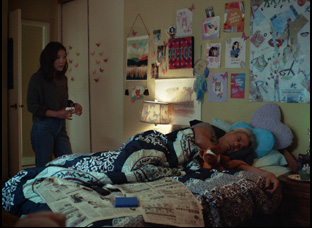
Yeah, they really made the film, When I first started writing, the film was about a Chinese- American male such as myself dealing with the family depression and after I wrote a few scenes, I realized it’d be 10 times more interesting if [the lead] was female, just because of all the crap that Chinese daughters have to put up with, like not being the boy and [having to be the] one that ends up cleaning up the mess in the end, and I knew the key was to find a lead that could really carry the film, so I need someone that could be really funny and sharp, but also dramatic as well. There aren’t many actors out there, Asian-American or not that could do both.
I always find it’s easier to find actors who are funny [can] transition to something dramatic than actors who are good at drama to understand humor, so I look for funny actors first and Ally Maki has been on my radar for years. She was on the TBS show “Wrecked,” and whenever she was on screen, she’s commanding the screen with her really sharp wit. Once I saw her doing that, I [thought], “That’s the kind of person we need,” so we targeted her from the onset and fortunately, she really liked it and when I met with her, she was like, “Oh yeah, my brothers got into a huge fist fight over the holidays — I totally understand his family.” So the script really spoke to her, and then when I was talking to her, she [said], “Who are you thinking of casting for the other roles?” And I said, “Well, actually I really wanna get Hayden Szeto for the youngest [brother] because I saw him in films like ‘Edge of Seventeen’ where I thought he was really terrific.” And she said, “Oh my gosh, I’m friends with Hayden!” And she like texted him and said, “Hey, you’ve got to look at this script.” So they actually knew each other before and had that brother-sister chemistry already.
And then Peter Kim, who’s actually a great standup comedian and comedy writer, was one of the last people we cast, but he’s just a really funny, kind and vulnerable guy, just like Roy is in the film, so it was easy with the three of them. They’re all like terrifically funny people and also really great improvers. I saw that from the beginning from rehearsal, so [during the shoot] after we did a few takes that followed the script, I’d let them go off by themselves and do a take or two where they could just improv and that was really wonderful. I’d say maybe 25% of the film was stuff that they added that was either funny or brought another aspect of the character to the film that wasn’t in the script before. They got into that chemistry really fast. Plus, during the shoot, we rented out Airbnb near the set, and we all stayed there because it was during COVID, so it was like summer camp. We’d go do our shoot, and we’d come back at night and have dinner together and hang out.
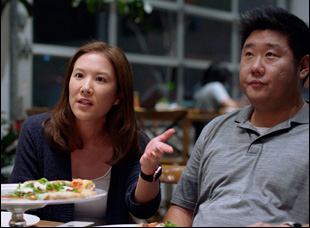
The parents’ house is based on my own parents’ house. I grew up in Fremont, near Milpitas, and it’s the same where a lot of people grew up in these suburban tract houses that [had] three or four bedrooms and a lot of people are like my parents where they stopped buying furniture in 1995, so when you go back to the house, it basically looks like it did when I was in college and high school, so it’s like a time warp. Outside, you’re a certain person, and when you go home and [it’s like you’re] in a time machine set back to when you were a kid again. Your parents treat you like a little kid and you’re still in the same room that has all the same posters that you had when you were a kid, so you almost regress a little bit. That’s what I wanted to do with this house that I wanted to feel like it was trapped in the 1990s and also would trap Margaret in that time when she was a kid and hated being there and having the idea of these suburban areas, especially like in Bay Area, where the majority of the population has become Asian-American was really interesting to me.
Is it true that at least a few of those action figures in the film are of your personal collection?
Yeah, it may be true. [laughs] There might be more than a few in the background that are mine. That gave me a unique perspective on Larry, the youngest brother’s character’s nerdiness for sure.
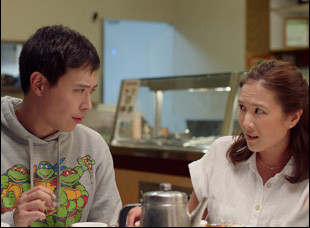
It was really great. When I first was writing the film, I really wanted to have music that was custom made. One of my favorite films is “The Graduate,” where Simon and Garfunkel matched music to what the scene was, and as we got into pre-production, I figured I can’t afford a real singer-songwriter, but maybe I’d be able to find a hippie folk singer at a coffee shop who could do a few tunes. But as it turns out, [I found] Emi Meyer, a really amazing jazz lounge singer [who is] Asian-American but lives in Japan and her [songs] have been top 10 jazz tunes on iTunes in Japan. She just has really amazing voice and songwriting ability and she [actually] e-mailed me to say, “Hey, I heard about your film and I’d love to do music for it.”
We talked a little bit and she really loved the script. I sent her a couple scenes early on before we even shot the film, saying, “Hey, here’s a couple of scenes you might want to do songs for. Just try try something out.” And the first song she sent me was pretty much the song that’s in the scene where Margaret is cleaning up her dad’s room that she has to live in, and it’s called, “It’s Alright.” When I heard it, I nearly cried. It was so perfect and it was just really a perfect matchup of a singer-songwriter who understood the script and us having the time to have her do it, so all the music in there is custom created by Emi Meyer and her songwriting partner.
What’s it been like to get this out into the world after all this time?
It’s been a lot of work, but it’s really gratifying when you’re sitting in an edit room for 500 hours and you’re working on a film not knowing if it’s even good because you’re so deep into it. We played in 35 film festivals everywhere in the U.S. and it’s been really amazing to see that people relate to this family no matter what their cultural background is and they see it as an American family. A lot of people just tell [me], “I know a dad like that. I know a sister like that. I know a brother like that” and people would laugh at one minute and then they turn around start crying because they really want to see what happened with this family and they connected with them. So it makes all this hard work worth it to see so many people come up to me and say this film spoke to me in this way or inspired me to talk with my friends and family about mental health and depression. That’s the reason I made the film and to see that’s actually doing it is really great.
“Dealing with Dad” is now available on demand Prime Video, Google Play, Apple TV and Redbox and opens theatrically on May 19th at the Monica Film Center in Los Angeles.




